|
|
|
Sort Order |
|
|
|
Items / Page
|
|
|
|
|
|
|
| Srl | Item |
| 1 |
ID:
077604
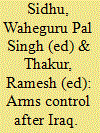

|
|
|
|
|
| Publication |
New York, United Nations University press, 2006.
|
| Description |
x, 452p.
|
| Standard Number |
9789280811315
|
|
|
|
|
|
|
|
|
|
|
|
Copies: C:1/I:0,R:0,Q:0
Circulation
| Accession# | Call# | Current Location | Status | Policy | Location |
| 052364 | 327.174/SID 052364 | Main | On Shelf | General | |
|
|
|
|
| 2 |
ID:
050955
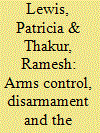

|
|
|
| 3 |
ID:
053234
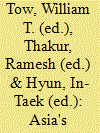

|
|
|
|
|
| Publication |
New Delhi, Manas Publications, 2004.
|
| Description |
x, 342p.
|
| Standard Number |
8170491975
|
|
|
|
|
|
|
|
|
|
|
|
Copies: C:2/I:0,R:0,Q:0
Circulation
| Accession# | Call# | Current Location | Status | Policy | Location |
| 048460 | 306.09521/TOW 048460 | Main | On Shelf | General | |
| 054466 | 306.09521/TOW 054466 | Main | On Shelf | General | |
|
|
|
|
| 4 |
ID:
128435
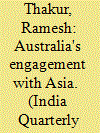

|
|
|
|
|
| Publication |
2013.
|
| Summary/Abstract |
The ebb and flow of coping with Australia's identity dilemma as a European settler society located on the geographical edge of Asia leads to bouts of agonising, excitement and temporising. This has been given particular cogency with the power shift underway from the trans-Atlantic to the Asia-Pacific. The 2012 White Paper set 25 national objectives to be met by 2025, with targets ranging from improving trade links and increasing scholarships to teaching priority Asian languages. But in this transactional embrace of Asia that highlights economic and trade links, gaps might open up between ambition and delivery, especially amidst continuing evidence of insensitivity to how Asians forge lasting relationships. Ties with China are dominated by trade but security concerns remain. Relations with India should improve with the removal of the nuclear issue as an irritant and growing trade and tourist numbers. Japan remains an important trade and diplomatic partner. And geography and demography ensure that Indonesia is no less important to Australia than Asia's big three.
|
|
|
|
|
|
|
|
|
|
|
|
|
|
|
|
| 5 |
ID:
174230
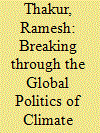

|
|
|
|
|
| Summary/Abstract |
In preparation for the UN discussions in September and the Madrid climate conference in December, a spate of reports warned that the natural environment and ecological systems that sustain all forms of life are collapsing. 1 Laurie Laybourn-Langton, lead author of a report from the Institute for Public Policy Research (IPPR) in February 2019, wrote that “the environment is breaking down, with consequences which include more drought, famine, forced migration and war. Environmental breakdown poses a catastrophic risk.”
|
|
|
|
|
|
|
|
|
|
|
|
|
|
|
|
| 6 |
ID:
053209
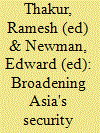

|
|
|
|
|
| Publication |
Tokyo, United Nations University press, 2004.
|
| Description |
xii, 357p.
|
| Standard Number |
9280810944
|
|
|
|
|
|
|
|
|
|
|
|
Copies: C:1/I:0,R:0,Q:0
Circulation
| Accession# | Call# | Current Location | Status | Policy | Location |
| 048480 | 355.03305/THA 048480 | Main | On Shelf | General | |
|
|
|
|
| 7 |
ID:
074863
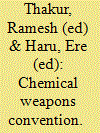

|
|
|
|
|
| Publication |
Tokyo, United Nations University press, 2006.
|
| Description |
xi, 190p.
|
| Standard Number |
9280811231
|
|
|
|
|
|
|
|
|
|
|
|
Copies: C:1/I:0,R:0,Q:0
Circulation
| Accession# | Call# | Current Location | Status | Policy | Location |
| 051887 | 341.735/THA 051887 | Main | On Shelf | General | |
|
|
|
|
| 8 |
ID:
098080
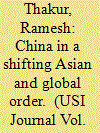

|
|
|
| 9 |
ID:
151670
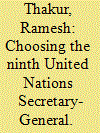

|
|
|
|
|
| Summary/Abstract |
This year marks the final year for the present editorial team. The four editors were chosen in part for their individual expertise in areas of global governance. For four years, as a matter of policy, the editors have refrained from submitting any of their own articles to the journal. In this final year, they have decided to write one Global Forum essay each as a way of saying farewell. This following is the first such essay by Ramesh Thakur.
|
|
|
|
|
|
|
|
|
|
|
|
|
|
|
|
| 10 |
ID:
109804
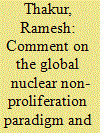

|
|
|
|
|
| Publication |
2012.
|
| Summary/Abstract |
Rajiv Nayan's article is both important and interesting. It is important because nuclear weapons pose a threat to humanity and the planet that in magnitude, severity and immediacy is the gravest of all known risks confronting us today.
|
|
|
|
|
|
|
|
|
|
|
|
|
|
|
|
| 11 |
ID:
005688
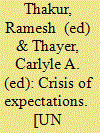

|
|
|
|
|
| Publication |
Boulder, Westview Press, 1995.
|
| Description |
xvii, 317p.
|
| Standard Number |
0813388406
|
|
|
|
|
|
|
|
|
|
|
|
Copies: C:1/I:0,R:0,Q:0
Circulation
| Accession# | Call# | Current Location | Status | Policy | Location |
| 037100 | 341.584/THA 037100 | Main | On Shelf | General | |
|
|
|
|
| 12 |
ID:
108578
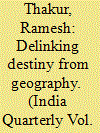

|
|
|
|
|
| Publication |
2011.
|
| Summary/Abstract |
The November 2008 terrorist attacks in Mumbai are analysed through six changing equations in India-Pakistan relations. The balance between military response and inaction is shifting towards the former. India has a vested but no longer critical interest in a strong and stable Pakistan. Pakistan's deniability has been based on separation between the government, army, ISI and terrorists whose plausibility is fading. To reverse the worsening security situation, Pakistan's military must be brought under full civilian control. Failing that, India will have to acquire the military capacity and political will to destroy the human and material infrastructure of terrorism in Pakistan. Finally, the rewards for Pakistan's contributions to the war on terror in Afghanistan exceed penalties for its fuelling of terror in India. The structure of incentives and penalties must be reversed.
|
|
|
|
|
|
|
|
|
|
|
|
|
|
|
|
| 13 |
ID:
147224
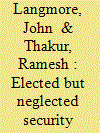

|
|
|
|
|
| Summary/Abstract |
Many of the pressing policy challenges confronting the world's countries and peoples—climate change, pandemics, food and water scarcity, terrorism, financial meltdown—are international in origin and nature, global in scope and effects, and require concerted multilateral action led by the major powers. However, the responsibility for making policy and the authority to mobilize the requisite coercive resources to tackle the threats remain vested in sovereign states. Absent a world government, the order, stability, and predictability in international transactions comes from global governance operating as a patchwork of authority structures which produce generally adhered-to norms to regulate behavior, and layers of mechanisms to punish noncompliance.
|
|
|
|
|
|
|
|
|
|
|
|
|
|
|
|
| 14 |
ID:
067735
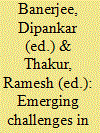

|
|
|
|
|
| Publication |
New Delhi, Samskriti, 2006.
|
| Description |
xxviii, 256p.
|
| Standard Number |
8187374454
|
|
|
|
|
|
|
|
|
|
|
|
Copies: C:1/I:0,R:0,Q:0
Circulation
| Accession# | Call# | Current Location | Status | Policy | Location |
| 050704 | 327.54052/BAN 050704 | Main | On Shelf | General | |
|
|
|
|
| 15 |
ID:
049966
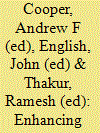

|
|
|
|
|
| Publication |
Tokyo, United Nations University press, 2002.
|
| Description |
xi, 308p.
|
| Standard Number |
928081074X
|
|
|
|
|
|
|
|
|
|
|
|
Copies: C:1/I:0,R:0,Q:0
Circulation
| Accession# | Call# | Current Location | Status | Policy | Location |
| 046300 | 341.2/COO 046300 | Main | On Shelf | General | |
|
|
|
|
| 16 |
ID:
073518
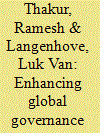

|
|
|
| 17 |
ID:
123987
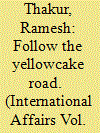

|
|
|
|
|
| Publication |
2013.
|
| Summary/Abstract |
The question of whether Australia should change government policy to permit the export of uranium to India has divided Australians, arms control advocates and scholars. This article does not take a position for or against Australia's export of uranium to India. Instead, it argues that the concept of 'the national interest' is misleading as the analytical framework for assessing this important foreign policy decision, and leads to a distorted analysis and policy prescription.
It is not all that difficult for the government to justify a decision to sell uranium to India as being in the national interest. But a more nuanced and complicated analysis results when the issue is discussed using a novel analytical framework of 'a balance of interests'. 'The national interest' is erroneous as a description of the empirical reality, substitutes tautology for explanation and is unhelpful as a guide to policy.
'A balance of interests' is superior on all three counts of description, explanation and prescription. In addition, it captures human agency and allows for human error and multiple balances as weighed by different people reflecting their personal predilections, professional backgrounds, life and career experiences, party philosophy, and institutional interests and perspectives.
|
|
|
|
|
|
|
|
|
|
|
|
|
|
|
|
| 18 |
ID:
181178
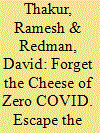

|
|
|
|
|
| Summary/Abstract |
On February 18, SKY News UK trumpeted that ‘Lockdown is working! COVID-19 infection rate plummets in England’. Yet, as Figure 1 shows, Sweden with voluntary social distancing guidelines experienced an earlier and faster decline of COVID deaths per capita. The other interesting feature about the figure is how the mortality curves are policy-invariant, mimicking one another regardless of policy interventions between Sweden, the UK and the EU countries. The virus infection, hospitalization and mortality curves seem to rise and fall by seasons, independent of lockdowns.
|
|
|
|
|
|
|
|
|
|
|
|
|
|
|
|
| 19 |
ID:
146265
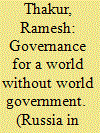

|
|
|
|
|
| Summary/Abstract |
There is no government for the world. Yet, on any given day, innumerable commercial, professional, diplomatic and personal cross-border activities take place in reasonable expectation of safety and security for the people, groups, firms and governments involved. Disruptions and threats are rare-indeed, in many instances rarer in the international domain than inside some countries. Thus international transactions are typically characterized by order, stability and predictability. This immediately raises a puzzle: how is the world governed even in the absence of a world government in order to produce norms, codes of conduct and regulatory, surveillance and compliance instruments? The answer is global governance whose content embraces the totality of laws, norms, policies and institutions that define, constitute and mediate relations between citizens, societies, markets and states in the international system.
|
|
|
|
|
|
|
|
|
|
|
|
|
|
|
|
| 20 |
ID:
005403
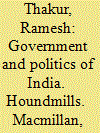

|
|
|
|
|
| Publication |
Houndmills, Macmillan, 1995.
|
| Description |
xviii,395p.
|
| Series |
Comparative Government and Politics Series
|
| Standard Number |
0333591879
|
|
|
|
|
|
|
|
|
|
|
|
Copies: C:1/I:0,R:0,Q:0
Circulation
| Accession# | Call# | Current Location | Status | Policy | Location |
| 036669 | 320.954/THA 036669 | Main | On Shelf | General | |
|
|
|
|
|
|
|
|
|